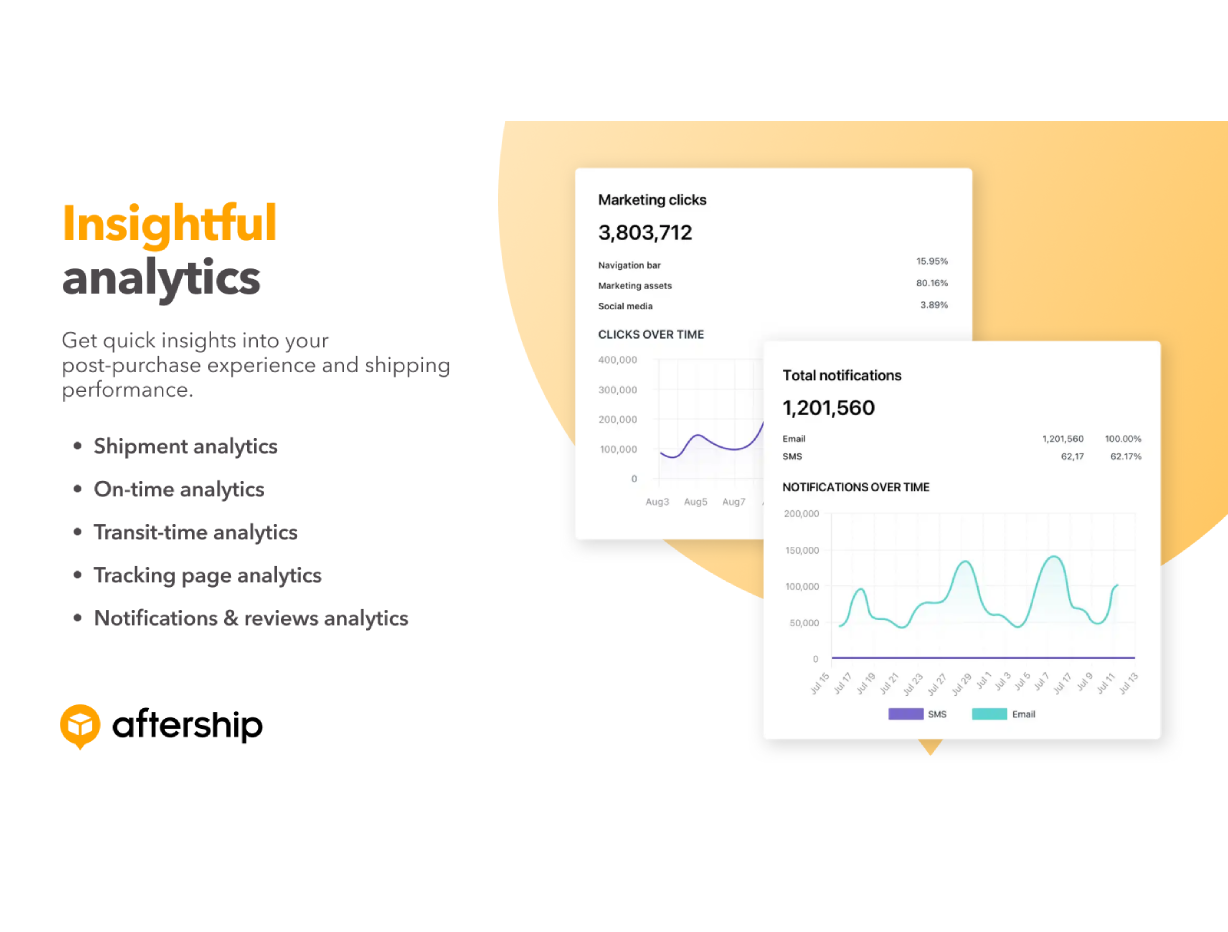Alternatives to DigitalGenius
1. AfterShip Tracking & Analytics
+Pros
- Comprehensive carrier coverage (1,212+ carriers)
- AI-powered delivery predictions using 4.4 billion shipment data points
- 99.99%+ API uptime
-Cons
- Pricing model instability
- Feature access constraints at lower pricing tiers
One highlighted feature and why it's amazing
Provides unified visibility across 1,212+ global carriers with 50+ added monthly .

Another highlighted feature of why it’s amazing
Leverage 4.4 billion shipment data points to deliver hour-level estimated delivery dates using multivariate analysis .
2. Gorgias
+Pros
- Ecommerce-specific AI automation capabilities
- Proven integration capabilities with Shopify
- Rapid implementation success with documented one-month migrations
- Revenue attribution tracking providing business impact visibility
-Cons
- Exclusive Shopify dependency for AI Agent capabilities
- AI cannot process image-based queries
- Technical constraints in multi-recipient email handling and English-optimized performance
One highlighted feature and why it's amazing
Represents Gorgias's primary differentiator, resolving up to 60% of customer emails autonomously for ecommerce brands under optimal conditions.

Another highlighted feature of why it’s amazing
Enable agents to edit orders, process refunds, and update shipping directly within the helpdesk interface.
3. Loop Returns
+Pros
- Shopify ecosystem integration provides seamless connectivity .
- Machine learning fraud detection system recovers $0.87 per $1 lost to fraud .
- Exchange optimization capabilities achieve 37% higher conversion rates compared to manual offers .
-Cons
- Requires 500+ monthly returns for optimal ROI .
- Shopify-centric approach creates dependency on that ecosystem.
- AI features require 50,000+ historical returns for optimal pattern recognition .
One highlighted feature and why it's amazing
Loop Returns employs machine learning algorithms to analyze return characteristics including geographic anomalies, customer history, and device details, providing real-time risk assessment during return submission .

Another highlighted feature of why it’s amazing
The platform's AI-driven incentive system analyzes customer behavior and product affinity to present personalized exchange options, achieving 37% higher exchange rates compared to manual offers .
Other Alternatives
Narvar
ReConvert
UpOrder
WeSupply
parcelLab
How We Researched This Guide
About This Guide: This comprehensive analysis is based on extensive competitive intelligence and real-world implementation data from leading AI vendors. StayModern updates this guide quarterly to reflect market developments and vendor performance changes.
185+ verified sources per analysis including official documentation, customer reviews, analyst reports, and industry publications.
- • Vendor documentation & whitepapers
- • Customer testimonials & case studies
- • Third-party analyst assessments
- • Industry benchmarking reports
Standardized assessment framework across 8 key dimensions for objective comparison.
- • Technology capabilities & architecture
- • Market position & customer evidence
- • Implementation experience & support
- • Pricing value & competitive position
Research is refreshed every 90 days to capture market changes and new vendor capabilities.
- • New product releases & features
- • Market positioning changes
- • Customer feedback integration
- • Competitive landscape shifts
Every claim is source-linked with direct citations to original materials for verification.
- • Clickable citation links
- • Original source attribution
- • Date stamps for currency
- • Quality score validation
Analysis follows systematic research protocols with consistent evaluation frameworks.
- • Standardized assessment criteria
- • Multi-source verification process
- • Consistent evaluation methodology
- • Quality assurance protocols
Buyer-focused analysis with transparent methodology and factual accuracy commitment.
- • Objective comparative analysis
- • Transparent research methodology
- • Factual accuracy commitment
- • Continuous quality improvement
Quality Commitment: If you find any inaccuracies in our analysis on this page, please contact us at research@staymodern.ai. We're committed to maintaining the highest standards of research integrity and will investigate and correct any issues promptly.